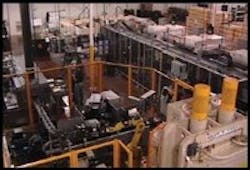Alive And Well In Automotive
Southern Michigan Tool & Machine's high-volume production cell.
After careful consideration, Southern Michigan Tool & Machine Inc. made a gutsy move: It partnered with a Tier One automotive supplier it had never worked with before and agreed to take on a long-term, high-volume job.
As a result of the partnership, the shop and its Tier One customer worked together to put a fully automated cell on Southern Michigan Tool & Machine's shop floor to machine the job's complex, high-tolerance automotive components.
"The Tier One supplier was willing to step up and also invest in the cell along with us," Mike Munsell, president of Southern Michigan Tool & Machine (www.smtool.com) said.
He added that the practice of suppliers investing some of their own capital to work with a shop appears to be a growing trend for high-volume automotive jobs. And, he said that there are still a lot of those jobs around because not every automotive part can be manufactured overseas. Parts that are too complex and have very tight tolerances, or parts that are big and heavy, typically don't make it to overseas shops, so a shop in the united States must be able to handle such parts if it wants to survive doing high-volume automotive work.
Prior to the automated cell project, Southern Michigan Tool & Machine saw much of the same downturns in work as other shops in the automotive industry. "We were either going to close our doors or restructure the business for the future, and we saw automation as the key to our success if we chose to restructure," said Munsell.
While the shop had already incorporated some automation, the turning point was the partnership with the Tier One customer, and that partnership also has led to some new customers. The shop now quotes about $60-million worth of jobs per year and is looking to new markets, such as medical.
"When potential customers see the cell out in the shop and realize the investment it took on our part, it gives them the confidence that we are serious about high-volume manufacturing, providing quality parts and being around for a while," added Munsell. The shop is ISO 9001/2000 certified and targeting TS16949 certification and dedicates itself to manufacturing production machined parts, metal stampings and tool and die services.
Four operators per shift (3 shifts per day) tend Southern Michigan Tool & Machine's "saving cell" that will produce a high-volume part using a single-piece-flow concept with robots and other automation. While the cell is technically dedicated to the specific automotive part, Southern Michigan Tool & Machine could easily reconfigure it for other jobs because its components are flexible, standalone units.
As part of the project, Southern Michigan Tool & Machine got the cell up and running and provided the facility, manpower, r&D expertise, training, and special metrology equipment needed. But the work did not stop there. Southern Michigan Tool & Machine constantly re-evaluates the cell's processes and keeps abreast of new technology that could potentially shorten cycle times and increase tool life for keeping the cell profitable and improving its output.
The cell performs nine basic machining operations. Parts enter the cell as raw castings, and automation loads them into two lathes that turn their I.D.s and O.D.s. From there, parts travel to an air blow-off station and down a track to an automated gage monitored by cell operators, but these operators never touch the parts. The gage feeds part data back to the turning machines to keep the parts in spec. After which, parts go to subsequent operations that include deburring, spline-broaching, grinding and washing.
Along with the cell, Southern Michigan Tool & Machine has launched several other new programs, and the company foresees continued future growth in automotive and non-automotive work using automation as its key to competitiveness.
